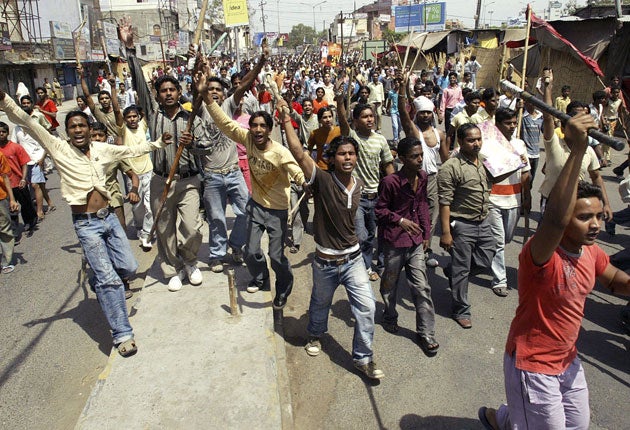Indian riots follow murder of Sikh leader in Austria

Violence swept across parts of India’s Punjab yesterday as followers of a Sikh sect attacked police stations and set fire to trains after one of its leaders was shot and killed by rivals while preaching at a temple in Austria.
The Prime Minister, Manmohan Singh, himself a Sikh, appealed for calm as police and demonstrators clashed in several north Indian cities. One demonstrator was killed and several wounded as police and troops opened fire. "I am deeply distressed by the outbreak of violence in Punjab following certain incidents in Vienna," Mr Singh said. "Sikhism preaches tolerance and harmony".
Large crowds defied a curfew that had been imposed late on Sunday night and turned their anger on police and officials following the incident in Vienna when a group of Sikhs wielding knives and a handgun attacked two preachers and their followers from a rival sect. One of the preachers, Sant Rama Nand, the group’s deputy leader, subsequently died from his injuries while its head, Sant Niranjan Dass, required emergency surgery. Around 15 others were hurt.
The dead men belonged to Dera Sach Khand, a Sikh sect of dalits, or untouchables, that has many members in and around the city of Jalandhar. The group, who follow the 14th-century teacher Guru Ravidas, sprung up in the 1920s in response to discrimination by higher-caste Sikhs. Sikhism teaches against caste inequality but in rural India it is still entrenched.
"The social structure of Punjab means there have historically been caste divisions," said Professor Surinder Jodhka of Jawarhalal Nehru University. He said the dalit Sikhs – many of whom were leather workers – began to organise in the 1920s after winning contracts for leather boots from the British Army. Following independence many of them migrated, and took their religious practices with them.
It appears that the attackers in Vienna were all members of a higher caste Sikh group. They claimed that the Dera Sach Khand preachers – who had travelled to Austria from India for special teaching sessions – were being disrespectful of the Sikh holy book, the Guru Granth Sahib. A police spokesman, Michael Takacs, said several hundred people were in the temple at the time of the attack and that the scene was “like a battlefield”. Some reports suggested the attackers may have been angered by the decision to give one of the preachers a ceremonial shawl, a ritual that is considered a high honour in Sikhism.
After the death of the 57-year-old preacher was announced in the early hours yesterday, hundreds of Dera Sach Khand followers armed with sticks, swords, bricks and stones and supported by other local dalit organisations, took to the streets of Jalandhar, burning several vehicles and a bank, stoning buses and blocking railway lines and roads. Sporadic violence was reported from nearby towns.
Last night, Home Minister P Chidambaram, said that around 1,000 paramilitaries had been dispatched to Punjab and a similar number were standing by. "The situation in Punjab is not quite normal," he said. "The state government has imposed a curfew in the affected areas."
Join our commenting forum
Join thought-provoking conversations, follow other Independent readers and see their replies
Comments
Bookmark popover
Removed from bookmarks